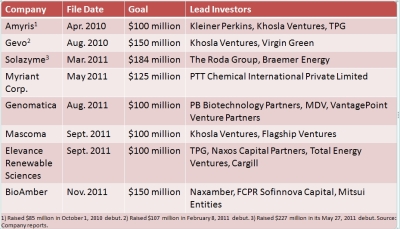The Biobased Chemicals Summit in San Diego wrapped up yesterday, and the topic that speakers and attendees kept circling back to was money. Is is available, how does my company get it, where should we invest it? I still have a mountain of material to sift through, but I pulled out a couple of key points in the interim:
- It’s a radically different IPO market than a year ago, and the outlook for those in the pipeline are uncertain.
A year ago, biochemical companies like Gevo and Amyris launched at the high end of their offer range and did well (initially at least; Amyris was at one point up 100% over its offer price). Companies that maybe would have waited to hit a milestone or two before  registering raced to file, either to ride that early momentum or beat competitors (who could fail and forever tarnish public perception).
registering raced to file, either to ride that early momentum or beat competitors (who could fail and forever tarnish public perception).
Speakers said that while it is too early to tell how successful those IPOs in the pipeline will be, what is certain is that they will have a tougher go of it than Gevo and Amyris. Investors now have the upper hand. Even in the overall IPO market, offer prices have been below range. This is likely to continue, particularly given ongoing macroeconomic uncertainty.
Oh, and IPO money is expensive. Bankers advise against using those funds as the majority financing for commercial assets.
- The dumb money is gone.
The biochemical industry has learned from previous mistakes and begun to mature. Investors have as well, and that means companies are under intense scrutiny and have to do all they can to derisk.
“Investors are looking for partnerships, joint ventures, a capital-light strategy, and off-take agreements,” says Sundeep Patel, managing director/investment banking at Barclays Capital (London) . Investors are wary about any uncertainty surrounding feedstock access, potential dependence on third party agreements, and high capital expenses.
Viable companies also have to demonstrate differentiated, protected technologies with a sustainable price advantage over time. An experienced management team is also key, as is a strong balance sheet.
But money is still available; LanzaTech announced earlier this week that it had raised $56 million in a Series C round.
- You better have all your ducks in a row.
Anyone speaking about a biochemical displacing a petrochemical in the market will provide a litany of attributes needed to succeed, the most important being ‘Don’t be new and definitely don’t be more expensive.’ But that doesn’t fill two days of panels, so many of the more established firms offered additional advice:
Don’t rely on subsidies to be cost-competitive. “The government giveth, and the government taketh away.”
Ink committed off-take agreements, showing potential investors that, if the first plant gets build, there are customers. Gevo has sold most of its initial isobutanol capacity to Sasol; Myriant’s CEO told attendees that most of its Lake Providence, LA succinic acid plant is sold out. Neither plant is online yet.
Don’t develop product-driven markets, develop market-driven products. The chemical industry wants biobased versions of familiar chemicals. If you’re producing a biobased chemical that can either be derivatized into a chemical already used in large-scale chemical manufacturing or can replace such a chemical—great. If your organisms/chemocatalytic process can produce it directly—-even better. For example, biobased succnic acid can replace petroleum-based succinic acid. It can be used in place of adipic acid in polyurethane production (no extra processing needed). Or it can be converted to 1,4-butanediol, itself a chemical with a large market in diverse applications.
Find a partner that brings something you need to the table, like downstream market knowledge. This may have felled bioplastics like PHA. Telles, a jv dissolved earlier this month, consisted of an agribusiness firm and a biotech start-up. Plastics manufacturers understand that thermoformers are cost-conscious and reluctant to switch materials Companies like Genomatica are partnering along the supply chain to bring in the competencies is needs; it has gained feedstock access knowledge through its partnership with Tate & Lyle; scale-up expertise from its deal with Mitsubishi, and understanding of downstream markets for packaging applications through its Novamont jv.

Pingback: Amyris Secures $83 Million, Genomatica and Mitsubishi Chemical Advance BioBDO Discussions | CW Renewables